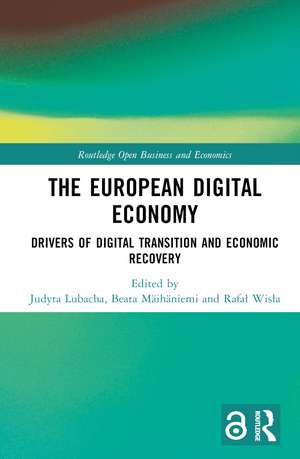The European Digital Economy: Drivers of Digital Transition and Economic Recovery: Routledge Open Business and Economics
Editat de Judyta Lubacha, Beata Mäihäniemi, Rafał Wisłaen Limba Engleză Hardback – 22 dec 2023
The purpose of this book is to analyse the effectiveness of digital technologies as well as the fundamental factors that contribute to technological progress in the long run. It also examines structural and qualitative shifts in economies and societies. It investigates many research questions, such as the gap between the level of digital economic development in European Union countries; digital transformation and its impact on workplace skills development patterns; and also the legal framework for data as resource. The book approaches these issues from a multidisciplinary perspective, from law to economics and sociology. It focuses on definitional discussions, the measurement challenges, drivers for digital transition, the impact on labour relations, digital skills and education, data reuse and data extractivism.
This is a comprehensive introduction to the different contexts from which the digital economy can be addressed, offering an innovative method for studying this complex phenomenon, and as such, it will be a valuable resource for students, scholars and researchers across a range of disciplines.
The Open Access version of this book, available at www.taylorfrancis.com, has been made available under a Creative Commons Attribution-Non Commercial-No Derivatives (CC-BY-NC-ND) 4.0 license.
Preț: 1002.68 lei
Preț vechi: 1222.78 lei
-18% Nou
Puncte Express: 1504
Preț estimativ în valută:
191.87€ • 205.17$ • 159.97£
191.87€ • 205.17$ • 159.97£
Carte tipărită la comandă
Livrare economică 17 aprilie-01 mai
Preluare comenzi: 021 569.72.76
Specificații
ISBN-13: 9781032584591
ISBN-10: 1032584599
Pagini: 244
Ilustrații: 10 Tables, black and white; 20 Line drawings, black and white; 20 Illustrations, black and white
Dimensiuni: 156 x 234 x 16 mm
Greutate: 0.52 kg
Ediția:1
Editura: Taylor & Francis
Colecția Routledge
Seria Routledge Open Business and Economics
Locul publicării:Oxford, United Kingdom
ISBN-10: 1032584599
Pagini: 244
Ilustrații: 10 Tables, black and white; 20 Line drawings, black and white; 20 Illustrations, black and white
Dimensiuni: 156 x 234 x 16 mm
Greutate: 0.52 kg
Ediția:1
Editura: Taylor & Francis
Colecția Routledge
Seria Routledge Open Business and Economics
Locul publicării:Oxford, United Kingdom
Public țintă
PostgraduateCuprins
Introduction Part I: Measuring the Digital Economy 1. The Dimensions of the Digital Economy and Society 2. Measuring the Digital Economy with “Digital Economy” tools 3. Differentiation of the Digital Economic Development in Europe Part II: Sources for Developing the Digital Economy 4. Digital Innovation Hubs as Drivers for Digital Transition and Economic Recovery: the Case of the Arctic Development Environments Cluster in Lapland 5. Digitalisation and the Impact on the Labour Relations 6. Digitalization and digital skills development patterns: evidence for European countries 7. Virtual reality in legal education: Challenges and possibilities to transform normative knowledge 8. The patent system and the problem of innovation diffusion in the digital economy Part III: Nature of Resources 9. Behind the transparency of ‘data reuse’ 10. Data Extractivism: Social Pollution and Real-World Costs 11. FinTech Future Trends: Secondary Data Review
Notă biografică
Judyta Lubacha is an Assistant Professor in the Department of Economics and Innovation of the Jagiellonian University, Krakow, Poland.
Beata Mäihäniemi is a University Researcher, Faculty of Law, University of Lapland, Finland.
Rafał Wisła is a Professor of Economics in the Department of Economics and Innovation of the Jagiellonian University, Krakow, Poland.
Beata Mäihäniemi is a University Researcher, Faculty of Law, University of Lapland, Finland.
Rafał Wisła is a Professor of Economics in the Department of Economics and Innovation of the Jagiellonian University, Krakow, Poland.
Descriere
The purpose of this book is to analyse the effectiveness of digital technologies as well as the fundamental factors that contribute to technological progress in the long run. It also examines structural and qualitative shifts in economies and societies.












